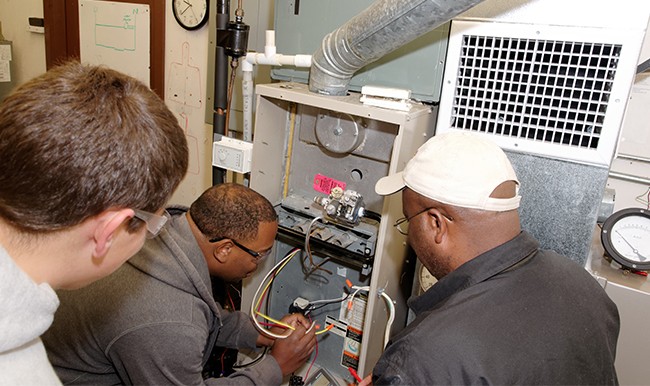Are you interested in studying at the ITI Technical College for a career in the HVAC industry? If the challenge of working with air conditioners and refrigeration devices is something that appeals to you, then you’ll be able to get a lot of value and personal satisfaction from your chosen field. Many new HVAC license trainees are excited to get started with the course, but it is also important to look ahead at what your job might have in store for you.
Whether you’re already thinking about applying, or you just want to learn more about the HVAC industry, the following jobs and responsibilities will give you a clear idea of what you could be doing in the near future.
Life After Heating and Ventilation Training
With an HVAC certification, you will be one of the most in-demand professionals in the United States. Everywhere from North America, to Europe, and even South East Asia, the HVAC industry is booming. With more demand for refrigeration and climate control, there’s also high demand for qualified installers and service technicians. These are just some of the tasks you would need to perform if you decide to pursue the field.
 If you’re like most technicians, you will probably consolidate your learning and develop your skills by starting off working on domestic installations, maintenance, and faults. This could include designing and installing central air systems, or working on refrigerators or split type air conditioning units. With the reduction in energy costs as well as cost of devices, there are now more HVAC related devices in homes than ever before. You may choose to specialize in a certain area, such as repairs or installations, but whatever you do, you will find that the early stages of your employment will be hugely rewarding, and will help you to solidify everything that you will learn in HVAC school.
If you’re like most technicians, you will probably consolidate your learning and develop your skills by starting off working on domestic installations, maintenance, and faults. This could include designing and installing central air systems, or working on refrigerators or split type air conditioning units. With the reduction in energy costs as well as cost of devices, there are now more HVAC related devices in homes than ever before. You may choose to specialize in a certain area, such as repairs or installations, but whatever you do, you will find that the early stages of your employment will be hugely rewarding, and will help you to solidify everything that you will learn in HVAC school.
With experience, good references, and the right ambition, you could find yourself eventually working in one of America’s largest commercial HVAC companies. The challenges in this role will be different, and you’ll need to be able to design, troubleshoot, and maintain HVAC systems of the largest scale. This could include systems that cool large office buildings, or even large refrigeration systems in processing plants or even in the biotech industry. If you are able to continually develop the skills that you learn in HVAC school, then you will find that your opportunities are virtually limitless. The further you progress, the more challenging your job will become, and it will make a welcome change when compared to the standard re-gassing, cleaning, and basic installation jobs that you will start out with in the industry.
Keep in mind that to be able to get into the industry, employers will want to see either an HVAC certification, or an approved apprenticeship program on your resume. Certification is the quickest way to get qualified, and it can allow you to learn all of the necessary skills and theory before you actually enter the field. For many, classroom based learning is more desirable than an apprenticeship, and in some cases it can allow you to develop a better understanding of the more technical aspects of air conditioning and refrigeration, even before you start your first job.
Start Your Future Now!
 If you want to be challenged while also perform a rewarding job, then a career in air conditioning and refrigeration would be the perfect option. Great job security, plenty of opportunities, and generous compensation are just some of the reasons why HVAC School would be a smart move for your future.
If you want to be challenged while also perform a rewarding job, then a career in air conditioning and refrigeration would be the perfect option. Great job security, plenty of opportunities, and generous compensation are just some of the reasons why HVAC School would be a smart move for your future.
Call us today to discuss course requirements, enrollment process and to ask any questions that you might have about the course or our school in general. At ITI Technical College, we’re committing to helping our students succeed, and we’d love to have you on board for our next program start!
For more information about graduation rates, the median debt of students who completed the program, and other important information, please visit our website: https://iticollege.edu/disclosures/




